#it’s by Louis ducis
Text
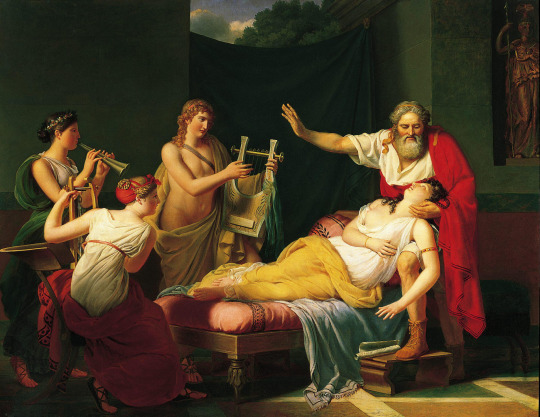
Louis Ducis (French, 1775-1847)
Sappho Recalled to Life by the Charm of Music, ca.1811
Norton Simon Museum
#Louis Ducis#French#french art#1700s#sappho#art#fine art#mediterranean#european art#europa#classical art#europe#european#oil painting#fine arts#cradle of civilization#sappho recalled to life by the charm of music#1800s#southern europe#painting#blonde#brunette#brunet#mythology#mythological art
33 notes
·
View notes
Text
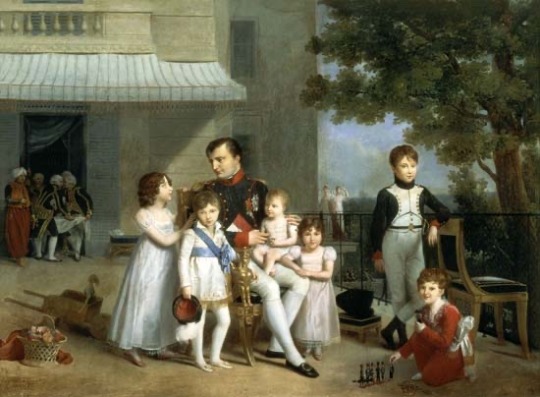
Rating: Cute!
This Napoleon is surrounded by chicks! Contrary to Napoleons’ reputations for stoicism, they tend to have a fondness for children. This Napoleon is even cradling a future Napoleon III on its knee, very cute!
40 notes
·
View notes
Text
Ink Black Heart research dump
Chapter Six - Epigraph
Properzia Rossi by Felicia Hemans
Felicia Hemans is the author of the openings “The boy stood on the burning deck” (from Casabianca) and “The stately homes of England” (from The Homes of England) neither of which I like at all, but Properzia Rossi is a doozy. The thoughts of supposedly heart-broken sculptor Properzia de’ Rossi (1490-1530), a self-taught artist from Bologna, famous for carving fruit stones amongst other things, as she creates her last sculpture. It is possibly based on this painting by Louis Ducis (1775-1847) which “represents her showing her last work, a basso-relievo of Ariadne, to a Roman Knight, the object of her affection, who regards it with indifference”.

She does seem a little scantily dressed for chisel work.
https://en.wikipedia.org/wiki/Properzia_de%27_Rossi
http://digital.library.upenn.edu/women/hemans/records/rossi.html
I have had a really good time finding all this out and I have learned two new words: ekphrasis = a vivid, often dramatic, verbal description of a visual work of art, either real or imagined, and caesura = a pause near the middle of a line of poetry.
It’s long ...
Tell me no more, no more
Of my soul's lofty gifts! Are they not vain
To quench its haunting thirst for happiness?
Have I not lov'd, and striven, and fail'd to bind
One true heart unto me, whereon my own
Might find a resting-place, a home for all
Its burden of affections? I depart,
Unknown, tho' Fame goes with me; I must leave
The earth unknown. Yet it may be that death
Shall give my name a power to win such tears
As would have made life precious.
I.
ONE dream of passion and of beauty more!
And in its bright fulfillment let me pour
My soul away! Let earth retain a trace
Of that which lit my being, tho' its race
Might have been loftier far.–Yet one more dream!
From my deep spirit one victorious gleam
Ere I depart! For thee alone, for thee!
May this last work, this farewell triumph be,–
Thou, lov'd so vainly! I would leave enshrined
Something immortal of my heart and mind,
That yet may speak to thee when I am gone,
Shaking thine inmost bosom with a tone
Of lost affection;–something that may prove
What she hath been, whose melancholy love
On thee was lavish'd; silent pang and tear,
And fervent song, that gush'd when none were near,
And dream by night, and weary thought by day,
Stealing the brightness from her life away,–
While thou–Awake! not yet within me die,
Under the burden and the agony
Of this vain tenderness–my spirit, wake!
Ev'n for thy sorrowful affection's sake,
Live! in thy work breathe out!–that he may yet
Feeling sad mastery there, perchance regret
Thine unrequited gift.
II.
It comes,–the power
Within me born, flows back; my fruitless dower
That could not win me love. Yet once again
I greet it proudly, with its rushing train
Of glorious images:–they throng–they press–
A sudden joy lights up my loneliness,–
I shall not perish all! The bright work grows
Beneath my hand, unfolding, as a rose,
Leaf after leaf, to beauty; line by line,
I fix my thought, heart, soul, to burn, to shine,
Thro' the pale marble's veins. It grows–and now
I give my own life's history to thy brow,
Forsaken Ariadne! thou shalt wear
My form, my lineaments; but oh! more fair,
Touched into lovelier being by the glow
Which in me dwells, as by the summer-light
All things are glorified. From thee my wo
Shall yet look beautiful to meet his sight,
When I am pass'd away. Thou art the mould,
Wherein I pour the fervent thoughts, th' untold,
The self-consuming! Speak to him of me,
Thou, the deserted by the lonely sea,
With the soft sadness of thine earnest eye,
Speak to him, lorn one, deeply, mournfully,
Of all my love and grief! Oh! could I throw
Into thy frame a voice, a sweet, and low,
And thrilling voice of song!–when he came nigh,
To send the passion of its melody
Thro' his pierced bosom–on its tones to bear
My life's deep feeling as the southern air
Wafts the faint myrtle's breath,–to rise, to swell,
To sink away in accents of farewell,
Winning but one, one gush of tears, whose flow
Surely my parted spirit yet might know,
If love be strong as death!
III.
Now fair thou art,
Thou form, whose life is of my burning heart!
Yet all the vision that within me wrought,
I cannot make thee! Oh! I might have given
Birth to creations of far nobler thought,
I might have kindled, with the fire of heaven,
Things not of such as die! But I have been
Too much alone; a heart, whereon to lean,
With all these deep affections that o'erflow
My aching soul, and find no shore below,
An eye to be my star; a voice to bring
Hope o'er my path like sounds that breathe of spring,
These are denied me–dreamt of still in vain,–
Therefore my brief aspirings from the chain,
Are ever but as some wild fitful song,
Rising triumphantly, to die ere long
In dirge-like echoes.
IV.
Yet the world will see
Little of this, my parting work, in thee,
Thou shalt have fame! Oh, mockery! give the reed
From storms a shelter,–give the drooping vine
Something round which its tendrils may entwine,–
Give the parch'd flower a rain-drop, and the meed
Of love's kind words to woman! Worthless fame!
That in his bosom wins not for my name
Th' abiding place it ask'd! Yet how my heart,
In its own fairy world of song and art,
Once beat for praise!–Are those high longings o'er?
That which I have been can I be no more?–
Never, oh! never more; tho' still thy sky
Be blue as then, my glorious Italy!
And tho' the music, whose rich breathings fill
Thine air with soul, be wandering past me still,
And tho' the mantle of thy sunlight streams
Unchang'd on forms instinct with poet-dreams;
Never, oh! never more! Where'er I move,
The shadow of this broken-hearted love
Is on me and around! Too well they know,
Whose life is all within, too soon and well,
When there the blight hath settled;–but I go
Under the silent wings of Peace to dwell;
From the slow wasting, from the lonely pain,
The inward burning of those words–"in vain,"
Sear'd on the heart–I go. 'Twill soon be past,
Sunshine, and song, and bright Italian heaven,
And thou, oh! thou, on whom my spirit cast
Unvalued wealth,–who know'st not what was given
In that devotedness,–the sad, and deep,
And unrepaid–farewell! If I could weep
Once, only once, belov'd one! on thy breast,
Pouring my heart forth ere I sink to rest!
But that were happiness, and unto me
Earth's gift is fame. Yet I was form'd to be
So richly bless'd! With thee to watch the sky,
Speaking not, feeling but that thou wert nigh:
With thee to listen, while the tones of song
Swept ev'n as part of our sweet air along,
To listen silently;–with thee to gaze
On forms, the deified of olden days,–
This had been joy enough;–and hour by hour,
From its glad well-springs drinking life and power,
How had my spirit soar'd, and made its fame
A glory for thy brow!–Dreams, dreams!–the fire
Burns faint within me. Yet I leave my name–
As a deep thrill may linger on the lyre
When its full chords are hush'd–awhile to live,
And one day haply in thy heart revive
Sad thoughts of me:–I leave it, with a sound,
A spell o'er memory, mournfully profound–
I leave it, on my country's air to dwell,–
Say proudly yet–"'Twas hers who lov'd me well! "
#research dump#the ink black heart#epigraphs#robert galbraith#felicia hemans#poetry#properzia rossi#properzia de' rossi#louis ducis
2 notes
·
View notes
Text
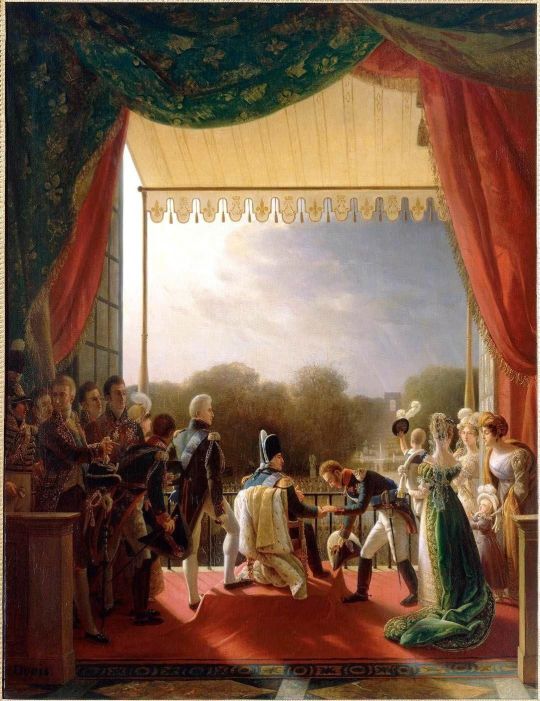
Luis XVIII
"Todas as pessoas sensatas concordavam que a era das revoluções fora de uma vez para sempre encerrada por Luís XVIII, cognominado o imortal autor da Carta."
Victor Hugo, "Os Miseráveis"; pintura de Louis Ducis. Victor Hugo, que na adolescência apoiara a Restauração dos Bourbons era, desde 1849, "liberal, socialista, democrata e republicano".
1 note
·
View note
Text

Bianca Cappello Fleeing with her lover Francesco de Medici
Louis Ducis (1775-1847)
0 notes
Photo

Et quia solum Guilielmum Capuanorum Principem habebat superstitem, veritus ne eumdem conditione humanae fragilitatis amitteret, Sibiliam sororem Ducis Burgundiae duxit uxorem, quae non multo post Salerni mortua est, et apud Caveam est sepulta. Tertio Beatricem filiam Comitis de Reteste in uxoris accepit, de qua filiam habuit, quem Constantiam appellavit.
Chronicon Romualdi II, archiepiscopi Salernitani, p. 16
Beatrice was born around 1135 in the county of Rethel (northern France) from Gunther (also know as Ithier) de Vitry, earl of Rethel, and Beatrice of Namur.
On her mother’s side, Beatrice descended from Charlemagne (through his son, Louis the Pious), while on the paternal side she was a grandniece of Baldwin II King of Jerusalem (her paternal grandmother Matilda, titular Countess of Rethel, was the King’s younger sister). The Counts of Rethel were also vassals of the powerful House of Champagne, known for its successful marriage politics (Count Theobald IV of Blois-Champagne’s daughter, Isabelle, would marry in 1143 Duke Roger III of Apulia, eldest son of King Roger II of Sicily).
In 1151, Beatrice married this same Roger. The King of Sicily was at his third marriage at this point. His first wife had been Elvira, daughter of King Alfonso VI the Brave of León and Castile and of Galicia, who bore him six children (five sons and one daughter). However, when four of his sons (Roger, Tancred, Alphonse and the youngest, Henry) died before him, leaving only William as his heir, Roger II must have feared for his succession. In 1149, the King then married Sibylla, daughter of Duke Hugh II of Burgundy. She bore him a son, Henry (named after his late older brother), and two years later died of childbirth complications giving birth to a stillborn son. As this second Henry died young too, Roger thought about marrying for a third (and hopefully last) time.
It is possible that Roger’s choice of his third wife had been influenced by the future bride’s family ties with the Crusader royalties as Beatrice was related with both Queen Melisende of Jerusalem and the Queen’s niece Constance of Hauteville, ruling Princess of Antioch. Constance was also a first cousin once removed of Roger, who had (unsuccessfully) tried to snatch the Antiochian principality from her when her father Bohemond II was killed in battle 1130, leaving his two years old daughter as heir.
Beatrice bore Roger only a daughter, Constance, who was born in Palermo on November 2nd 1154. This baby girl (who would one day become Queen of Sicily) never knew her father as he died on February 26th.
Nothing certain is known about her widowed life, although we can suppose she took care of her only daughter. Beatrice died in Palermo on March 30th 1185, living enough to see Constance being betrothed to Emperor Frederick Barbarossa’s son, Henry.
The body of the Dowager Queen was laid to rest in the Chapel of St. Mary Magdalene, together with her predecessor, Elvira, and her step-children, Henry, Tancred, Alphonse and Roger. Through her daughter, Beatrice would become Emperor Frederick II’s grandmother.
Sources
Cronica di Romualdo Guarna, arcivescovo Salernitano Chronicon Romualdi II, archiepiscopi Salernitani Versione di G. del Re, con note e dilucidazione dello stesso
Garofalo Luigi, Tabularium regiae ac imperialis capellae collegiatae divi Petri in regio panormitano palatio Ferdinandi 2. regni Utriusque Siciliae regis
Hayes Dawn Marie, Roger II of Sicily. Family, Faith, and Empire in the Medieval Mediterranean World
Houben Hubert, Roger II Of Sicily: A Ruler Between East And West
SICILY/NAPLES: COUNTS & KINGS
Walter Ingeborg, BEATRICE di Rethel, regina di Sicilia, in Dizionario Biografico degli Italiani, vol. 7
#historicwomendaily#women#history#women in history#historical women#House of Hauteville#Roger II of Sicily#Beatrice of Rethel#norman swabian sicily#costanza i#people of sicily#women of sicily#myedit#historyedit
30 notes
·
View notes
Text
Louis Ducis, “Sappho Recalled to Life Through the Charm of Music”, 1811

3 notes
·
View notes
Text
Adevărul acestei lumi e moartea
Mai rău e că te întrebi mereu cum vei găsi a doua zi forța necesară să continui să faci ceea ce ai făcut și în ajun și faci de atâta timp, unde vei găsi forța pentru acele demersuri imbecile, mii de proiecte care nu duc nicăieri, ca să scapi de copleșitoare nevoie, tentative mereu eșuate și toate pentru a te convinge că destinul e de neînvins, că trebuie să te prăbușești în spatele zidului în fiecare seară, zdrobit de frica zilei de mâine, mereu mai precară, mai sordidă.
Mai vine și vârsta, poate, trădătoarea, și ne amenință cu ce-i mai rău. N-ai destulă muzică în tine să faci viața să danseze, asta e. Toată tinerețea ți s-a dus să moară de acum la capătul lumii, în liniște, în adevăr. Și unde să te mai duci oare, dacă nu mai ai în tine suficient delir adevărat? Adevărul, iată o agonie fără sfârșit. Adevărul acestei lumi e moartea. Trebuie să alegi, să mori sau să minți. Eu n-am putut niciodată să mă sinucid.
Louis-Ferdinand Celine - Călătorie la capătul nopții https://www.cititoramator.ro/2024/03/adevarul-acestei-lumi-e-moartea.html?utm_source=dlvr.it&utm_medium=tumblr
1 note
·
View note
Text
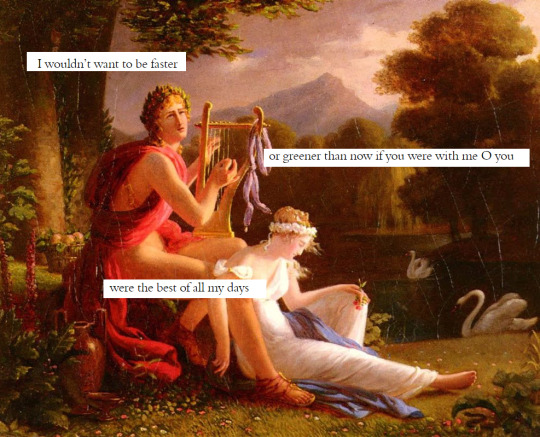
“Orphée Et Euridice (Orpheus and Euridice)” by Louis Ducis, with words from "Animals" by Frank O'Hara
1 note
·
View note
Photo
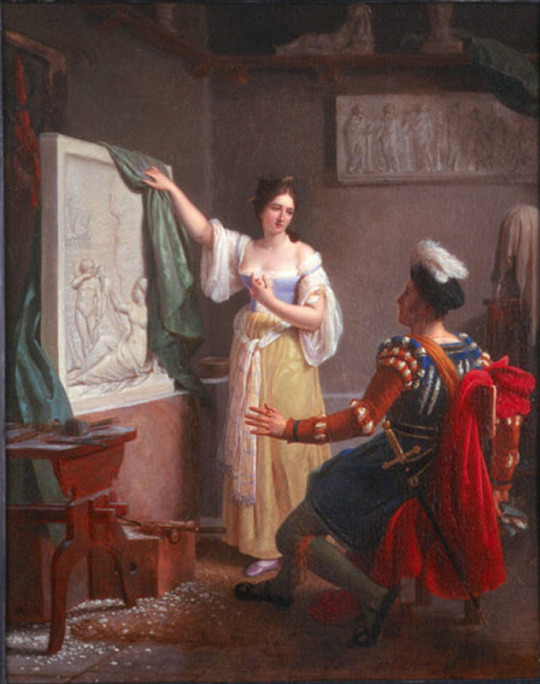
Properzia de' Rossi (c. 1490 Bologna – 1530 Bologna) was a ground-breaking female Italian Renaissance sculptor who lived a transgressive life. She was the only woman to feature as a headline artist in Vasari's Lives of the Artists. According to Vasari, she taught herself to carve by working with peach-stones. Right at the end of her life, she was sought out by the Pope Clement VII, who unfortunately found her dead.
13 notes
·
View notes
Text
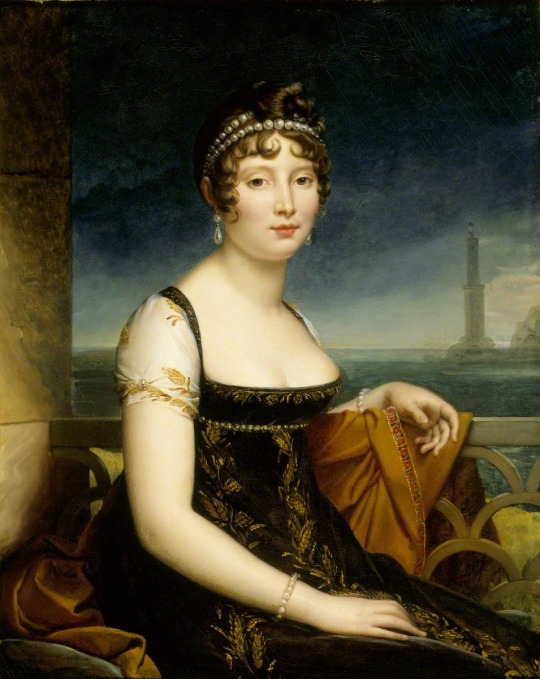
Caroline Murat, by Jean-Louis Ducis (1810).
64 notes
·
View notes
Photo
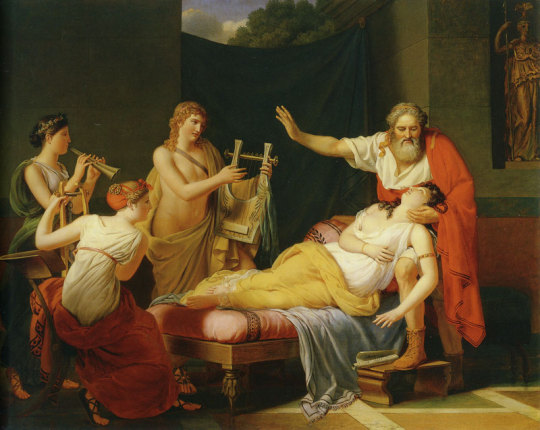
Jean Louis Ducis Sappho recalled to life by the charm of music 1811
30 notes
·
View notes
Text
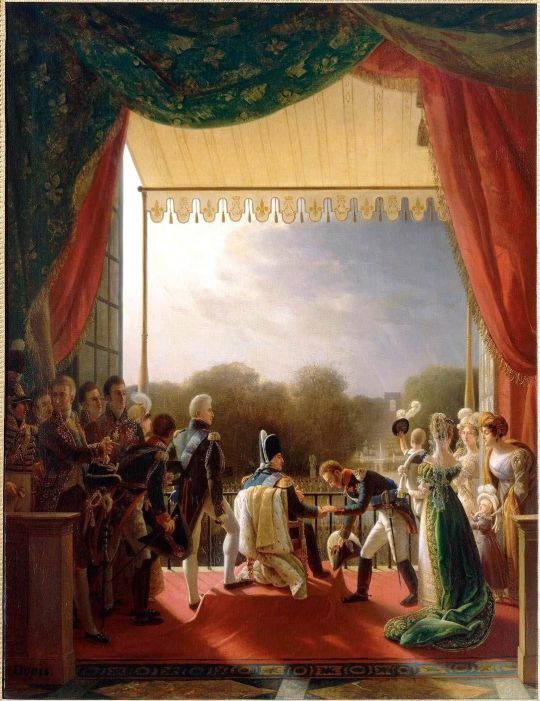
Louis XVIII and the French royal family assisting at the return of the troops of the Spanish expedition from the balcony of the Tuileries by Louis Ducis, 1824
28 notes
·
View notes
Photo

Louis Ducis - Orpheus and Euridice; and Dibulade, 1826.
0 notes
Photo

Caroline Bonaparte Murat, Queen of Naples, by Louis Ducis, circa 1810
Napoleon’s sister Caroline Bonaparte Murat was ambitious and enterprising. Although Caroline and her husband, Joachim Murat, owed their wealth and their crowns to Napoleon, when it looked like Napoleon was going to be defeated in 1814, they allied with Napoleon’s enemies. French Foreign Minister Talleyrand wrote that Caroline “had the head of Cromwell upon the body of a well-shaped woman. Born with much grandeur of character, strong mind, and sublime ideas; possessing a subtle and delicate wit, together with amiability and grace, seductive beyond expression; she was deficient in nothing but in the art of concealing her desire to rule; and when she failed in attaining her end, it was because she sought to reach it too quickly.” For details about this fascinating Bonaparte sibling, see “Caroline Bonapare Murat, Napoleon’s Treasonous Sister.”
57 notes
·
View notes
Text

Inktober 2020 Day 27 Music
References:
Characters: Hades (Supergiant Games) - Orpheus and Eurydice
Song: Good Riddance, Darren Korb (ft. Ashley Barrett)
Pose: Orphée Et Euridice, Louis Ducis, 1825
https://www.artrenewal.org/artists/louis-ducis/1567
Piano Arrangement: IONIC Music
4 more to go....
Edit: Btw, made a mistake in the notes and it is marked with red. Supposed to be at D and F.
52 notes
·
View notes